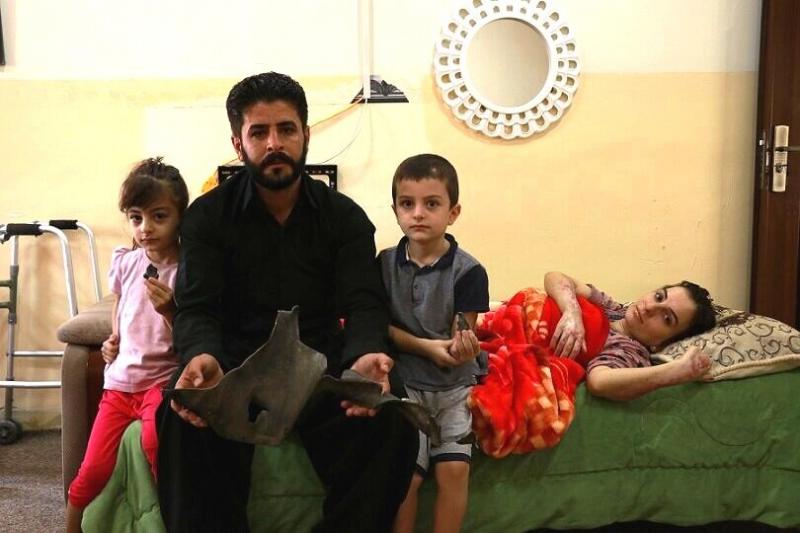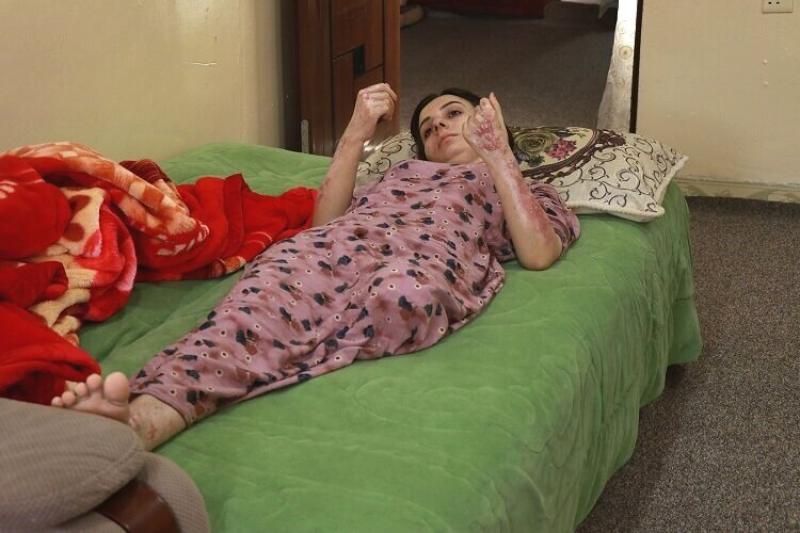On 25 June 2020, Peyman Talib with her son Hezhwan, daughter Hamisha and her husband Kaiwan Kawa were in their grocery store in Kuna Masi. Kuna Masi is hometown to dozens of families, a tree-lined river, and a picnic area that hundreds of families visit during weekends. Peyman’s family lives in Kuna Masi and owns a small business there. Seven years ago, Peyman graduated from the University of Slemani, where she got a bachelor’s degree in the Kurdish language to become a Kurdish language teacher. Explaining why she was working in the grocery store, she said, “The government does not hire new teachers or employees, that’s why I wanted to help my husband find an income for our family.”
While the whole family was in their shop, Kaiwan was helping to pack groceries for a customer when suddenly they could hear a terrible noise, and a powerful blast threw everyone to the ground. A rocket fired by a Turkish drone had exploded just 20 meters away from the shop. The explosion set the store on fire, killed the customer, and badly wounded members of the family.
“My wife was on fire, and my two children were covered in blood. I was able to take my wife and my children outside of the shop; then I realized I was also injured. I fainted and fell on the ground. My dad with my cousins and some other people took us to a nearby clinic in Qalachwalan and then sent us by ambulance to a hospital in Slemani*,” Kaiwan said.

Because Peymans left leg was so badly injured, doctors had to cut it off while she was conscious. They could not give her drugs due to the critically low level of blood in her body. Parts of Peyman’s right leg were burned and broken, and both of her arms were burned. Doctors operated on her right leg several times. Kaiwan and his two children were treated at another hospital.
Kaiwan told CPTers, “We were separated for about 40 days. Until now, my body has eight pieces of shrapnel inside. Hezhwan, my six-year-old son, has three pieces of shrapnel in his head. The doctors cannot take them out. Some individuals and organizations provided help for us. An organization promised us that on 1 September, they will take Peyman outside of the country to get her a smart leg, so we are waiting. Except for a few parliamentarians, the mayor and the governor, no other officials contacted or visited us.”
With a cry inside her throat, Peyman told CPT, “It will be very difficult for me; our life just turned upside down. Even if I get a smart leg, I cannot easily take care of myself and my family. The doctors told me that even with a new leg I won’t be able to stand for extended periods of time. That means I won’t be able to be a teacher in the future. I am on the bed all the time. But life will continue and I will not give up. I am not the only victim of the Turkish bombardments. Many others were killed and injured before me and my family. And still there are bombing civilians. This must be stopped.”

Peyman and her family spoke to CPT on 16 August 2020, during a visit to the house in Slemani where they live now. Kaiwan’s sister dedicates herself to taking care of them. Peyman has to go to the hospital five times a week to get physical therapy for three hours.
Peyman and Kaiwan told CPT that a member of the Turkish Parliament for the People’s Democratic Party (HDP), Hüseyn Kaçmaz, spoke and advocated for them inside the Turkish Parliament. They want their story to be heard everywhere around the world.
Together with Peyman, CPT calls on Turkey to stop bombing civilians in Iraqi Kurdistan and beyond. CPT calls on NATO to break their silence towards one of its members who continues to destroy the lives of families like Peyman and Kaiwan’s.
*“Slemani” is the city’s Kurdish name and “Suleimaniyah” is the Arabic name.




